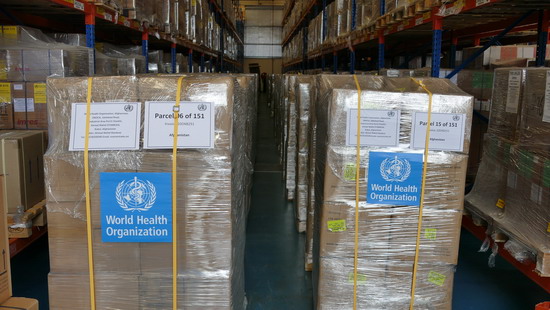
5 July 2020 – The World Health Organization (WHO) has delivered a shipment of essential COVID-19 medical supplies and equipment to the Central Medical Store of the Ministry of Public Health of Afghanistan. The shipment worth US$ 1.6 million includes 9.5 tons of personal protective equipment (gloves, gowns, surgical masks, face shields, goggles), 10 PCR machines, 100 oxygen concentrator machines, 100 stretchers, 319 RNA extraction kits, micropippets, pippet tip filters, biosafety cabinet and other critical items.
“COVID-19 is overwhelming the already challenged health care system in Afghanistan. Laboratories and hospitals require these essential items and WHO is working around the clock to provide critical medical supplies and equipment to support the Ministry of Public Health in ensuring that essential health services are maintained and strengthened,” said Dr Rik Peeperkorn, WHO Representative in Afghanistan. "Globally, there is a shortage of COVID-19 essential medical supplies and equipment and WHO, with support from the World Food Programme, is assisting in prioritizing essential items for more than 135 countries in need".
This latest WHO shipment will bolster efforts to keep frontline medical staff safe as they are at a high risk of infection, and improve testing capacity in the country, which continues to be a top priority during the ongoing response. “When the pandemic started there were no COVID-19 testing facilities in Afghanistan but under the leadership of the Ministry, WHO has since established 11 testing laboratories with a total capacity to perform 2500 tests per day. Plans to further expand testing through another 10 sites is under way,” said Dr Peeperkorn.
Since February 2020, WHO has provided approximately US$ 4.2 million worth of COVID-19 supplies and equipment to Afghanistan for distribution based on need. An additional US$ 15.4 million worth of supplies and equipment are planned.
Ongoing procurement is part of the overall larger support that WHO is providing under the United Nations "Global Humanitarian Response Plan for COVID-19" to address immediate needs related to COVID-19. WHO has defined 8 pillars that guide preparedness for and response to COVID-19 at the country level:
- coordination and response planning;
- risk communication and community engagement;
- surveillance, rapid response and case investigation;
- surveillance and awareness at Points of Entries;
- expansion of testing laboratories and staff training;
- infection prevention and control;
- case management, and operational and logistics support.
Aligned with and complementary to the Government’s approach, the United Nations in its assistance to governments and partners is focusing its COVID-19 support on 3 areas given the far reaching implications of the pandemic. These include, health, which is led and coordinated by WHO, humanitarian support, and social protection and economic recovery.
“Greater solidarity and substantial financial support are needed from the international community to help Afghanistan respond to both the short- and long-term impacts of the pandemic,” added Dr Peeperkorn.
Related link
United Nations Global Humanitarian Response Plan for COVID-19


